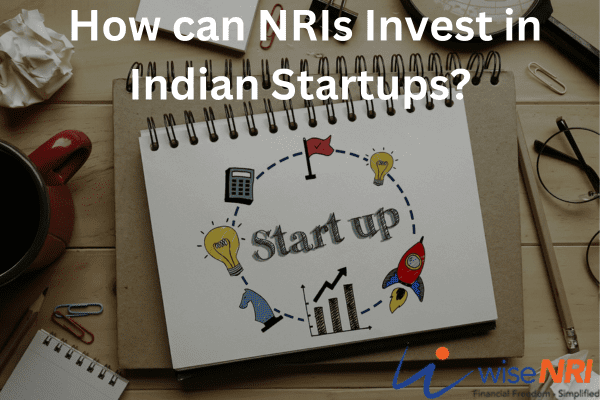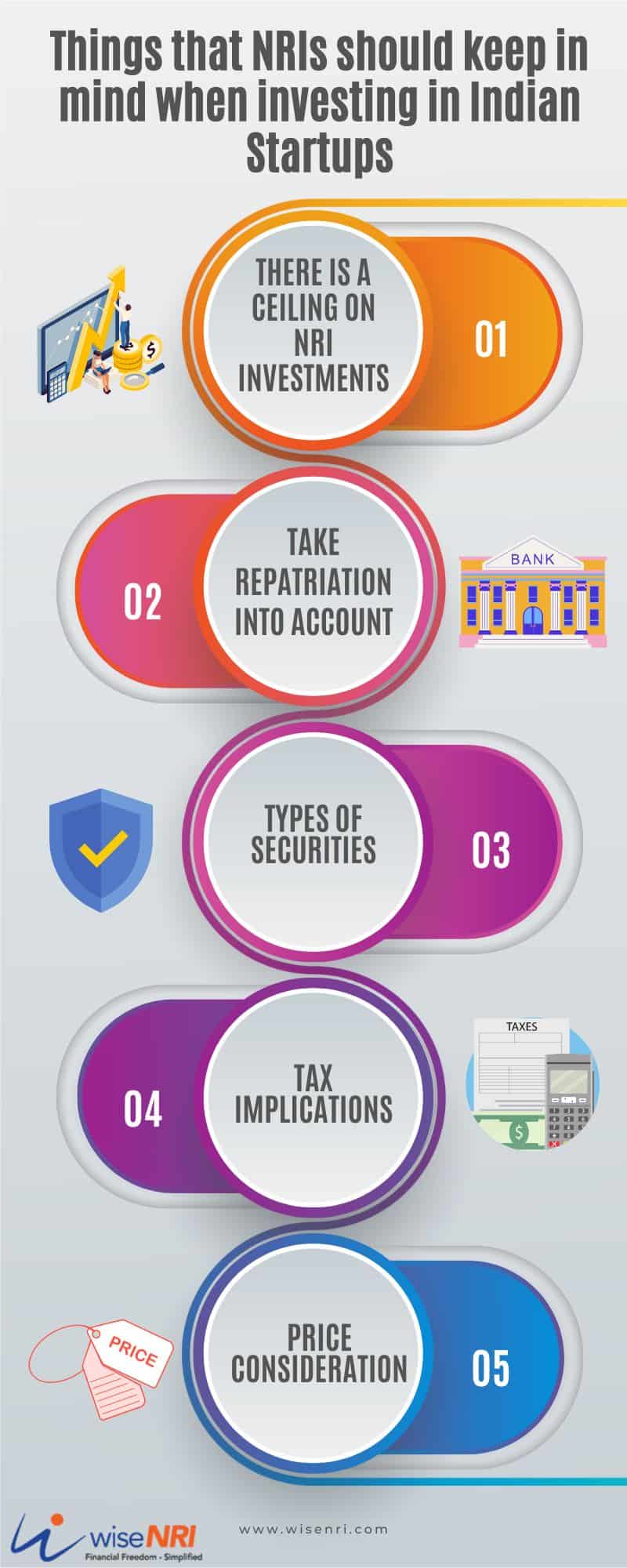In today’s digital age, the Indian startup ecosystem is thriving, offering lucrative investment opportunities for Non-Resident Indians (NRIs). Whether you’re seeking to support innovation, diversify your portfolio, or tap into the potential of India’s entrepreneurial landscape, this post will guide you through the process of investing in Indian startups as an NRI and tax on those investments.
Join us as we explore the various avenues, regulatory frameworks, and key considerations that can empower NRIs to make informed investment decisions and become a part of India’s startup revolution.

Must Read- NRI Investment Options in India
India’s rapid growth momentum is helping the nation to attract foreign direct investments (FDI). One of the biggest beneficiaries of this wave is the booming startups in India.
There were over 40 unicorns in 2021 positioning India as the world’s startup capital, only behind Israel. Even the rise in the valuations of these startups has attracted many new investors including Non-resident Indians.
How can NRIs Invest in Indian Startups?
Angel Investing in India
An angel investor is one of the first “outsiders” investing in a company for a small stake. Generally, these companies are very small, have tested (or just planned on paper) their product/service with limited success, and need funds to expand their market. As the risk involved is very high, diversifying your investment in such companies is a good option.
Becoming an Angel investor is a function of connections as well as chance. Many startups approach established angel investors to raise capital. If you are a part of such a network, you get the opportunity to sift through multiple ideas. Then you can zero in on the ones that catch your fancy.
Many professionally managed networks also offer Funds-as-a-Service and multiple avenues to invest for NRI investors.
Seed Funding
As the business grows, the interest in its product or service also increases with potentially visible future growth. In the seed funding round, a little mature business may now ask for greater investments while offering a smaller pie of the equity. Many Angel investing platforms also offer seed investing opportunities to NRI investors.
Alternative Investment Funds
The Alternative Investment Fund or AIF is a special investment vehicle differing from traditional investment avenues. As the name suggests, it is chiefly concentrated in alternative investment categories including hedge funds, angel funds, VC funds, infrastructure funds, and social venture funds.
AIFs are pooled investments by hundreds, if not thousands, of investors but are not open to the general public. This is because of the high risk involved and the complex structure of these funds. It is done by placing a minimum ticket size of Rs. 1 crore. NRIs with a great risk appetite and investible surpluses should partake in AIFs.
The Securities and Exchange Board of India (SEBI) has categorized AIFs into three categories. As only Category 1 AIFs invest in a registered startup, we will discuss in detail the types of funds falling in this category. Funds in other categories are also listed for your benefit.

Must Read – Why Investing In India A Great Option For NRIs
Category 1
Funds that NRI invest in start-ups, new but commercially viable businesses, and SMEs with a high growth potential. These funds can again be of three types:
- Venture Capital Funds: investing in new-age businesses requiring financing in their early days.
- Angel Funds: investing in start-ups bringing management experience, technical knowledge, and much-needed capital infusion.
- Infrastructure Funds: invest in startups in the infrastructure space including railways, construction, airports, ports, etc.
- Social Venture Funds: investing in organizations and businesses that have a far-reaching social impact and are not solely focused on commercial successes.
Category 2
- Private Equity Funds
- Debt Funds
- Fund of Funds
Category 3
- Private Investment in Public Equity Funds
- Hedge Funds
Investing in AIF gives NRIs the option to diversify their portfolio in the high-risk high-return space but there are certain issues to consider:
- The minimum investible amount is Rs. 1 crore. (but you can invest this in 3 years)
- The AIF must be registered with SEBI.
- The maximum number of investors in an AIF is 1000.
In a sense, AIFs allow you to invest in startups in multiple ways.
NOTE: SEBI has introduced new provisions regarding angel funds, offering certain relaxations to investors. As per the revised guidelines, it is now mandated for angel investors to contribute a minimum investment amount of INR 25 Lakhs towards the angel fund. These amendments aim to streamline and strengthen the investment landscape for angel funding, providing potential opportunities for both investors and startups in India.
Tax Implications for NRIs Investing in Startups in India
Investors who are non-residents and choose to invest in Indian startups should be aware of the tax implications associated with their investments. The tax rates for capital gains vary depending on the type of asset and the duration of the investment.
For short-term capital gains, which apply to investments held for less than 24 months, non-residents with a valid PAN Card are subject to a tax rate of 15% on the gains. However, if the non-resident investor does not have a valid PAN Card, the tax rate increases to 30% of the gains.
On the other hand, long-term capital gains tax applies to investments held for more than 24 months. Non-resident investors with a valid PAN Card are subject to a tax rate of 10% on the gains. For non-residents without a valid PAN Card, the tax rate for long-term capital gains is 20% of the gains.
It is important for non-resident investors to understand and comply with the applicable tax regulations when investing in Indian startups to ensure compliance and optimize their financial outcomes.

Check – NRI investment in Commercial Property
Things that NRIs should keep in mind when investing in Indian startups
1. There is a ceiling on NRI investments
For equity investments in Indian startups, there are ceiling limits placed by the RBI beyond which NRIs, and other foreign investors, cannot invest. Depending on the sector, the total NRI investments can either be 10% or 24% of the total paid-up capital of the company. Investment by a single NRI, however, cannot be beyond 5% of the total paid-up capital of the company.
2. Take repatriation into account
NRIs can invest via NRO (Non-Resident Ordinary), NRE (Non-Resident External), and FCNR (Foreign Currency Non-Resident) bank accounts.
If you invest via your NRO account, then the capital and the earnings (dividends and capital gains) thereon are non-repatriable. Whereas, for investments made through NRE or the FCNR account, the investment as well as the earnings both are repatriable.
Must Read- Portfolio Investment Scheme for NRI in India
3. Types of securities
The investments by NRIs will be considered as FDI, only if such an investment is for acquiring the following types of securities (called FDI Instruments):
- Equity shares with voting rights
- Fully and mandatorily convertible preference shares
- Fully and mandatorily convertible debentures
4. Price consideration
The Pricing Guidelines from the RBI mandate that the acquisition price of the FDI Instruments in a startup for NRIs cannot be less than the following:
A) Equity Shares
- the Fair Value of shares by a SEBI-registered Category – I Merchant Banker or a Chartered Accountant based on the Discounted Free Cash Flow (DCF) method.
- According to RBI’s Pricing Guidelines for the transfer of shares from a Resident to an NRI, if the original issue was on a preferential basis.
- Face value of shares, if the NRI investor is an initial subscriber to the Memorandum of Association of an Indian startup.
B) Fully and Mandatorily Convertible preference Shares/Debentures
The fair value and the conversion formula of such FDI instruments must be determined while issuing such instruments. In any case, the price at the time of conversion cannot be lower than the fair value at the time of issue.
Must Read – Investment Restrictions for NRIs
Wrapping Up
While it is essential to acknowledge the inherent risk associated with investing in startups, it is equally important to recognize the immense potential for substantial returns. Although there is a high probability of losing your investment in a startup, (90% of startups fail) there is an equally significant possibility of making a multi-bagger investment.
But as the famous saying goes, “Don’t put all your eggs in one basket,” it is advisable you do not invest more than 10 to 15 percent of your investible surplus in startups. And a single such investment should not account for more than 10% of your total investment in startups.
You can always consult your financial planner for seeking such opportunities and creating a well-diversified portfolio.
If you have any questions or experience regarding investing in startups in India – add in the comment section.

We started a startup and received a mandate to install renewable energy plants. How do we raise funds? It can give excellent ROI
My daughter currently in UAE and NRI now going to UG studies USA, But i have invested on PPF before and now it is matured , now want to close the PPF , will there be a Tax deduction if i show as NRI , also i have invested on childern Mutal fund , as she is becoming major want to transfer , so i have show in KYC as NRI and transfer Pls. advice